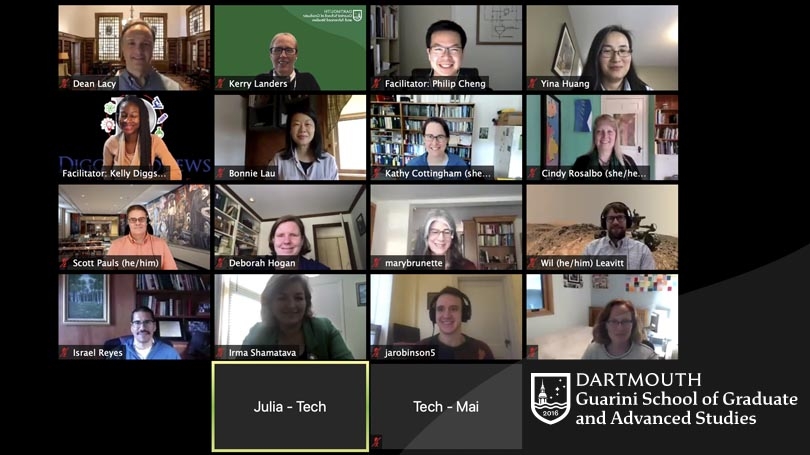
Participants from across the departments and programs particpated in a virtual mentor training in October.
In October last year, Dean of the Guarini School Jon Kull attended a mentoring training organized through the Center for Improving Mentoring Experiences in Research (CIMER). Dean Kull, Geisel School of Medicine faculty member Brock Christensen, and former Director of the Campus, Climate, and Culture Initiative (C3I), Theodosia Cook spent two days at the in-person training in Madison, Wisconsin and agreed it was something they wanted to bring back to faculty, postdocs, and graduate students at Dartmouth.
"The CIMER train-the-trainer session I attended was awesome. It was full of useful information, tips, and strategies for being a good mentor, as well as how to effectively pass this along to other faculty. I am committed to bringing these best practices to Dartmouth to help support and train our faculty to be mentors to postdoctoral scholars and graduate students," said Kull.
Fast-forward a year to October 2020 when faculty and staff colleagues were invited to participate in Facilitating Entering Mentoring, a 6-session online facilitator training workshop designed to increase the capacity for research mentor trainings. Topics covered a range of issues in mentoring and were designed as an array of tools to strengthen a mentor-mentee relationship, rather than simply offering a one-size-fits-all model.
"I was pleased to see how much of the curriculum went beyond the logistics of being an advisor and into some of the more nuanced topics related to truly being a mentor," noted Cindy Rosalbo, assistant director of the Dartmouth Center for the Advancement of Learning (DCAL), who participated in the virtual sessions.
"The facilitation processes are very similar to how we lead DCAL events and how we are recommending faculty teach and use breakout rooms in Zoom - like providing opportunities for independent and group work and giving specific topics to talk about and a place to record thoughts," she added.
Participants in the October training met early in December to discuss the next steps and agreed that the efficiency of the online format will enable the group to roll out the training to the community. While the in-person atmosphere was unavoidably lost, the virtual experience brought several benefits, including a shorter time commitment, and more seamless transitions from plenary to break-out sessions. Additionally, the virtual aspect will make securing training locations much less of a burden.
Deborah Hogan, Professor of Microbiology and Immunology, aims to incorporate the training into training grant-funded programs and into training grant proposals her department is submitting for in 2021.
Kathy Cottingham, Professor of Biological Sciences and the Ecology, Evolution, Environment, and Society (EEES) Graduate Program said she "would love to see a mentoring program for incoming faculty in the fall; it would bring a lot of broader benefits, especially in networking beyond individual departments and programs."
Cindy Rosalbo from DCAL said she hopes to collaborate with others to offer parallel training for the graduate students, noting training the mentees as an important aspect of a successful mentoring relationship.
"Kerry Landers [assistant dean for graduate services in Guarini, also a participant in the CIMER training] and I have discussed offering a parallel program for grad students and postdocs that would be a combination of preparing them to be mentors and discussing how to mentor up," says Rosalbo.
For next steps, the group will be working with CIMER to develop virtual modules that can be rolled out over the coming months for a broader group on campus, and eventually will offer regular in-person training sessions each term with the goal of having all Dartmouth faculty who work with graduate students or postdocs trained in mentoring best practices.
"I am very excited to see our group of trainers now pass this along to the broader Dartmouth community, and I'm glad people are excited enough to start virtually and not wait," said Kull.
Participants in the training were: Mary Brunette (Associate Professor of Psychiatry and Associate Professor of Community and Family Medicine Geisel School of Medicine), Kathryn Cottingham (Professor, Department of Biological Sciences and Professor, Ecology, Evolution, Environment and Society (EEES) Graduate Program), Karen Fortuna (Assistant Professor of Psychiatry, Geisel School of Medicine), Deborah Hogan (Professor of Microbiology and Immunology), Yina Huang (Associate Professor of Microbiology and Immunology, Associate Professor of Pathology and Laboratory Medicine), Dean Lacy (Professor of Government and Director, Program in Politics and Law), Kerry Landers (Assistant Dean of Graduate Student Affairs), William Leavitt (Assistant Professor of Earth Science), Silvia Navarro Murcia (postdoc researcher, department of Psychological and Brain Sciences), Scott Pauls (Professor of Mathematics, Cheheyl Professor and Director, Dartmouth Center for the Advancement of Learning), Israel Reyes (Associate Professor of Spanish and Portuguese, Director of Fellowships, Office of the Provost), and Cindy Rosalbo (Assistant Director, Dartmouth Center for the Advancement of Learning).
Edited to note the initative was developed in collaboration with the Guarini Student Council.